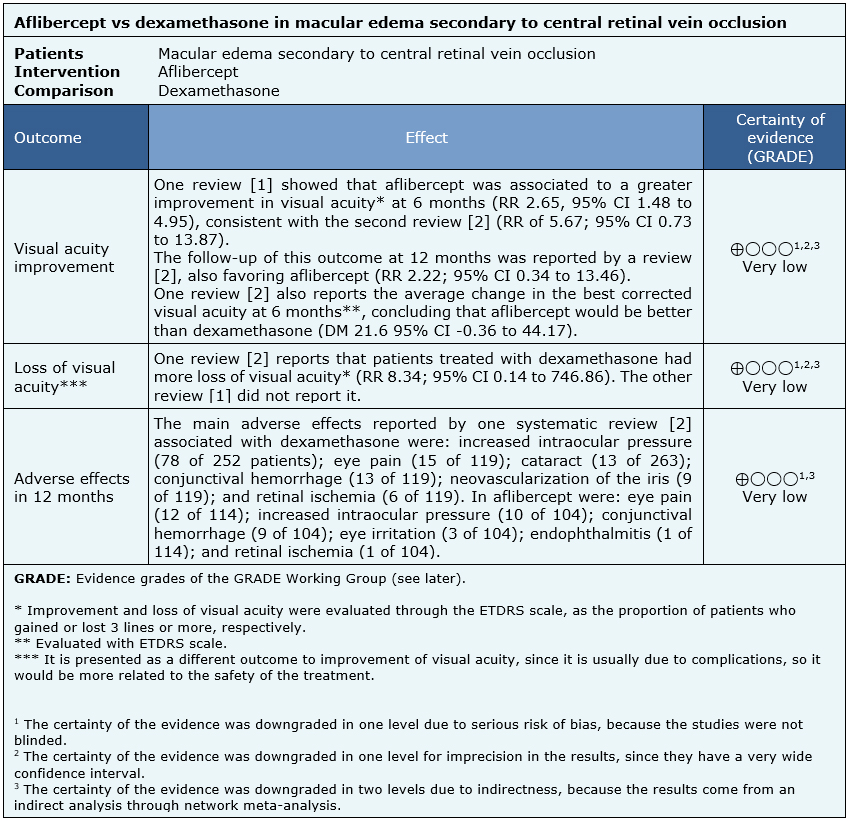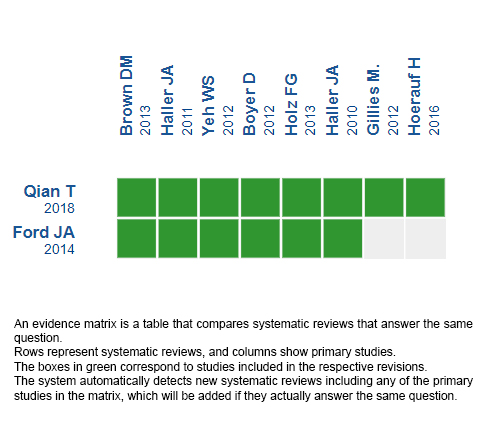Epistemonikos summaries
← vista completaPublished on December 26, 2019 | http://doi.org/10.5867/medwave.2019.11.7738
Aflibercept versus dexamethasone for macular edema secondary to central retinal vein occlusion
Aflibercept versus dexametasona en edema macular secundario a la oclusión de la vena central de la retina
Abstract
INTRODUCTION Macular edema is a frequent complication of central retinal vein occlusion that might lead to deterioration of visual acuity. The most commonly used treatments are dexamethasone implant and anti-vascular endothelial growth factor drugs, being aflibercept one of the most commonly used them. However, there is no consensus about which treatment constitute the best alternative.
METHODS We searched in Epistemonikos, the largest database of systematic reviews in health, which is maintained by screening multiple information sources, including MEDLINE, EMBASE, Cochrane, among others. We extracted data from the systematic reviews, reanalyzed data of primary studies, conducted a meta-analysis and generated a summary of findings table using the GRADE approach.
RESULTS AND CONCLUSIONS We identified two systematic reviews that included four primary studies overall, all randomized trials. We concluded that it is not possible to establish whether aflibercept is superior to dexamethasone in terms of improvement of visual acuity and safety, because the certainty of the existing evidence has been evaluated as very low.
Problem
Macular edema is a frequent complication of central retinal vein occlusion. It is characterized by the accumulation of fluid in the macula, which translates into a deterioration of visual acuity. The most common mechanism is the obstruction of the central vein of the retina by a thrombus, a situation that leads to the formation of new blood vessels and blood extravasation due to local inflammation, which in turn causes macular edema. Corticosteroid implants were mostly used to treat this pathology in the past due to the presence of inflammation, with slight improvements in symptoms. Over time, it has been observed that endothelial vascular growth factors have an important role in the formation of edema, since they are potent inducers of vessel formation, in addition to promoting their permeability. Currently, the most common treatment for this condition is the injection of drugs against vascular endothelial growth factor (anti-VEGF). However, it is not clear that anti-VEGF is superior than dexamethasone.
Methods
We searched in Epistemonikos, the largest database of systematic reviews in health, which is maintained by screening multiple information sources, including MEDLINE, EMBASE, Cochrane, among others, to identify systematic reviews and their included primary studies. We extracted data from the identified reviews and reanalyzed data from primary studies included in those reviews. With this information, we generated a structured summary denominated FRISBEE (Friendly Summary of Body of Evidence using Epistemonikos) using a pre-established format, which includes key messages, a summary of the body of evidence (presented as an evidence matrix in Epistemonikos), meta-analysis of the total of studies when it is possible, a summary of findings table following the GRADE approach and a table of other considerations for decision-making.
|
Key messages
|
About the body of evidence for this question
|
What is the evidence. |
We found two systematic reviews [1], [2] that included four primary studies [3], [4], [7], [9], reported in eight references [3], [4], [5], [6 ], [7], [8], [9], [10]. All corresponded to randomized trials. No studies were found comparing interventions directly, so all analyses come from indirect comparisons obtained through network meta-analysis technique. |
|
What types of patients were included* |
All selected trials included patients with a diagnosis of macular edema secondary to occlusion of the central vein of the retina. One trial [4] also considered patients with occlusion of branches of the central vein of the retina, but these were analyzed separately, so they are not part of the results of this summary. Two trials [7], [9] specified that patients should not have been older than 9 months since the diagnosis of the mentioned condition. No exclusion criteria were specified. |
|
What types of interventions were included* |
Two trials [7], [9] evaluated injections of aflibercept compared to placebo. Another trial [4] considered a dexamethasone implant against placebo. The fourth trial compared dexamethasone versus ranibizumab [3]. As mentioned earlier, the selected systematic reviews performed a network meta-analysis to indirectly compare these two treatments. |
|
What types of outcomes |
The trials reported multiple outcomes, which were grouped by systematic reviews as follows:
|
* Information about primary studies is not extracted directly from primary studies but from identified systematic reviews, unless otherwise stated.
Summary of findings
The information on the effects of aflibercept versus dexamethasone in patients with central retinal vein occlusion is based on four randomized trials [3], [4], [7], [9], from which two systematic reviews performed an indirect comparison using the network meta-analysis technique [1], [2].
Two trials (361 patients) [7], [9], compared aflibercept versus placebo, one trial (287 patients) [4] compared dexamethasone versus placebo, and one trial (243 patients) [3] compared dexamethasone versus ranibizumab.
It was not possible to reanalyze the information presented by the systematic reviews, so the results obtained directly from these are presented, instead of a reanalysis of the data.
The summary of findings is as follows:
- We are uncertain whether aflibercept compared to dexamethasone leads to a greater level of improvement in visual acuity, because the certainty of the evidence has been assessed as very low.
- We are uncertain whether dexamethasone compared to aflibercept leads to a greater loss of visual acuity, because the certainty of the evidence has been assessed as very low.
- We are uncertain whether aflibercept compared to dexamethasone leads to less adverse effects at 12 months of follow-up, because the certainty of the evidence has been assessed as very low.

| Follow the link to access the interactive version of this table (Interactive Summary of Findings – iSoF) |

Other considerations for decision-making
|
To whom this evidence does and does not apply |
|
| About the outcomes included in this summary |
|
| Balance between benefits and risks, and certainty of the evidence |
|
| Resource considerations |
|
| What would patients and their doctors think about this intervention |
|
|
Differences between this summary and other sources |
|
| Could this evidence change in the future? |
|
How we conducted this summary
Using automated and collaborative means, we compiled all the relevant evidence for the question of interest and we present it as a matrix of evidence.

Follow the link to access the interactive version: Aflibercept versus dexamethasone in macular edema secondary to central vein occlusion
Notes
The upper portion of the matrix of evidence will display a warning of “new evidence” if new systematic reviews are published after the publication of this summary. Even though the project considers the periodical update of these summaries, users are invited to comment in Medwave or to contact the authors through email if they find new evidence and the summary should be updated earlier.
After creating an account in Epistemonikos, users will be able to save the matrixes and to receive automated notifications any time new evidence potentially relevant for the question appears.
This article is part of the Epistemonikos Evidence Synthesis project. It is elaborated with a pre-established methodology, following rigorous methodological standards and internal peer review process. Each of these articles corresponds to a summary, denominated FRISBEE (Friendly Summary of Body of Evidence using Epistemonikos), whose main objective is to synthesize the body of evidence for a specific question, with a friendly format to clinical professionals. Its main resources are based on the evidence matrix of Epistemonikos and analysis of results using GRADE methodology. Further details of the methods for developing this FRISBEE are described here (http://dx.doi.org/10.5867/medwave.2014.06.5997)
Epistemonikos foundation is a non-for-profit organization aiming to bring information closer to health decision-makers with technology. Its main development is Epistemonikos database (www.epistemonikos.org).
Potential conflicts of interest
The authors do not have relevant interests to declare.

